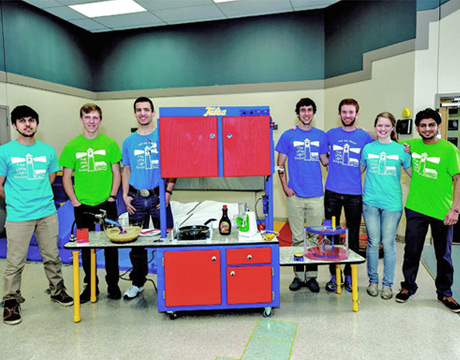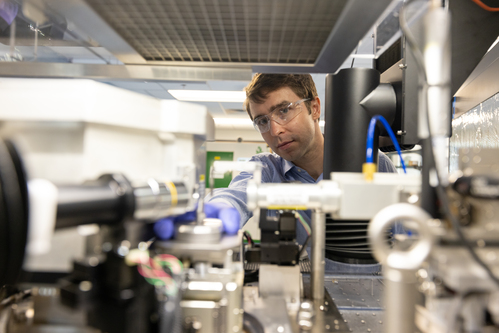A Kid's Kitchen
A Kid's Kitchen


Tulsa engineering students designed and constructed a kids' cookingcenter for the Little Light House.
For 25 years, University of Tulsa engineering students have used their talents to address the special needs of Oklahoma residents with physical and developmental disabilities.
The program is called Make a Difference Engineering—MADE at TU—and students from all departments in the College of Engineering and Natural Sciences are invited to participate. This year, seven seniors designed and built a small portable kitchen as an educational tool for developmentally challenged children.
The kitchen allows children to participate in food preparation ranging from mixing and chopping to slicing and dicing. Christopher Butler, Sam Carr, Mohamed Ghori, David Gogolakis, Salman Hassan Al-Ali, Joe Meier, and Khristen Thornburg worked directly with staff from the Little Light House, a tuition-free Christian center for preschool-age children with special needs.
Molly Smith, the Little Light House’s director of development, said, “The goal of the center is to provide hope for families of children with special needs and improve their quality of life.”
John Henshaw, chair of the university’s Department of Mechanical Engineering, is the MADE at TU advisor. “TU’s goals are broad—to use the engineering talents of students to make life better for people with disabilities,” Henshaw said. “This program not only helps the students develop comprehensive technical skills, but it also helps them gain the experience of client interaction.”
According to David Gogolakis, the team leader on the kitchen project, “The Little Light House pitched the project to us as a potential customer for our senior project and collectively, seven of us put about 1,400 hours in on creating the Mobile Cooking Center.”
The modified kitchen is designed to be safe and friendly for the children, who will use it under supervision of a therapist or aide. The cooking center is a completely functional mini kitchen with upper and lower cabinets for storage, two fold-down tables for counter space, an induction stovetop where the surface area around the pan doesn’t get hot, a cutting board, mixer, a mechanical arm to help pour ingredients into bowls, and a slicer and dicer.
The kitchen has options to accommodate different children, many of whom have mobility and sensory challenges. The TU students purchased a Ninja slicer and dicer and then built stands for it, so it can be operated by remote control. After the therapists plug the machine into a specific outlet, the children can push a button, allowing them to watch the process in action.
The kitchen has plastic knives that are safe for the kids to use with assistance. Therapists can attach different spoons or measuring cups to the pouring arm, which functions similar to a desk lamp. The arm can be repositioned to pour ingredients into a second bowl.
The design team helped the children make pancakes in the mobile kitchen the day it was delivered. According to Meier, a remote control device was used to operate the mixer to mix pancake batter. All of the kitchen’s components can be operated both manually and by remote control.
“The mechanical engineering students have listened to our needs of making all their projects accessible to all of our children,” said Dede Flately, physical therapist at the Little Light House. “They have provided projects that help the children with different aspects of their development by providing a fun activity that will not seem to be work to them.”
The goal of the center is to provide hope for families of children with special needs and improve their quality of life.Molly Smith, the Little Light House



